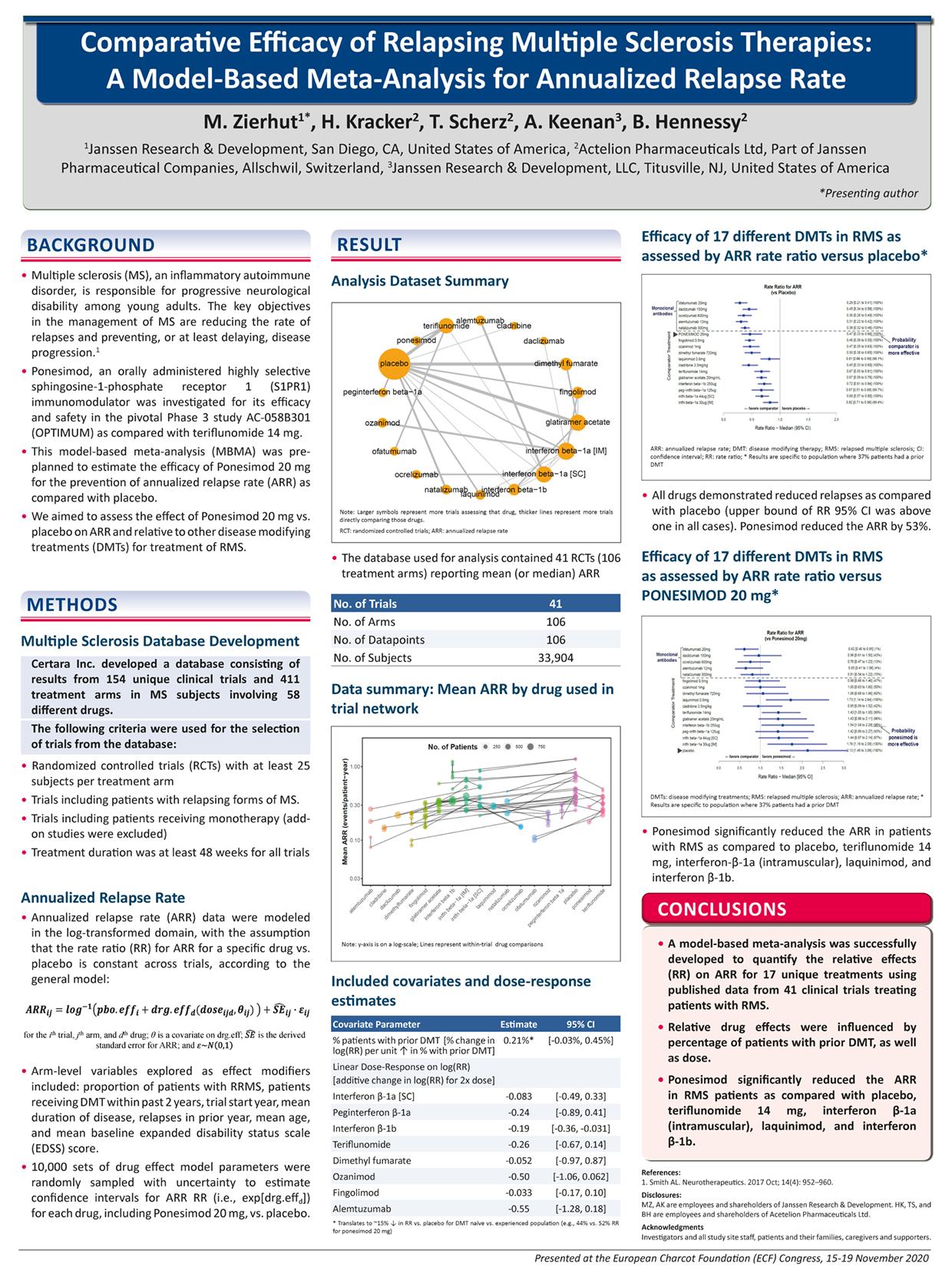Comparative Efficacy of Relapsing Multiple Sclerosis Therapies: A Model-Based Meta-Analysis for Annualized Relapse Rate
Abstract
Background:
Multiple sclerosis (MS), an inflammatory autoimmune disorder, is responsible for progressive neurological disability among adults. Ponesimod is a selective sphingosine-1-phosphate (S1P) receptor 1 immunomodulator under development for relapsing multiple sclerosis (RMS).
Objectives:
To assess effects of ponesimod on the annualized relapse rate (ARR) relative to other disease-modifying therapies (DMTs) used for treatment of RMS.
Methods:
A literature review was performed, returning 154 clinical trials with 58 MS treatments. Only randomized controlled trials (RCTs) with >30 patients receiving monotherapy for RMS for ≥48 weeks were included. Mean ARR for each treatment was modeled and rate ratios (RRs) between treatments were assumed constant from 48-156 weeks. Multiple variables were explored relative treatment effect modifiers: percent of patients with remitting RMS, trial start year, mean disease duration, percent of patients with history of DMT use in<2 years (pDMT), mean relapses, mean age, and mean baseline EDSS score.
Results:
Mean ARR data from 41 RCTs in RMS were utilized (18 unique treatments [including placebo], 106 treatment arms, 33,904 patients). Rate ratios were estimated for 17 treatments vs. placebo. A dose-response relationship was included if data at multiple doses were available and indicated a dose-dependent effect (8 treatments). Relative treatment effect was smaller in trials with higher pDMT. In addition to superiority of ponesimod vs. teriflunomide, ponesimod reduced ARR significantly compared to placebo (RR: 0.47; 95%CI: 0.32–0.68), interferon β-1a (intramuscular, 0.57; 0.39–0.85), laquinimod (0.58; 0.38–0.88), and interferon β-1b (0.65; 0.44–0.97). Ponesimod had numerically superior ARR benefits than interferon β-1a (subcutaneous), peginterferon β-1a, glatiramer acetate, and dimethyl fumarate (RR range: 0.68–0.94). Ponesimod had similar ARR benefits to S1P receptor modulators ozanimod, fingolimod, cladribine, and daclizumab (RR range: 1.00–1.04).
Conclusions:
Ponesimod reduced ARR in RMS patients as compared with placebo, teriflunomide 14 mg, interferon β-1a (intramuscular), laquinimod, and interferon β-1b.
Comparative Efficacy of Relapsing Multiple Sclerosis Therapies: A Model-Based Meta-Analysis for Annualized Relapse Rate
1M. Zierhut, 2H. Kracker, 2T. Scherz, 3A. Keenan, 2B. Hennessy
1Janssen Research & Development, San Diego, CA, United States of America, 2Actelion Pharmaceuticals Ltd, Part of Janssen Pharmaceutical Companies, Allschwil, Switzerland, 3Janssen Research & Development, LLC, Spring House, United States of America
Corresponding Author:
Alexander Keenan Global Market Access Leader, Schizophrenia and Neurodegeneration Janssen Research & Development, LLC Spring House, Pennsylvania E-mail: AKeenan1@its.jnj.com
Funding: This work was sponsored by Janssen Research & Development, LLC. Previous submission: A/ECTRIMS 2020, September 9-12, 2020, Washington DC

